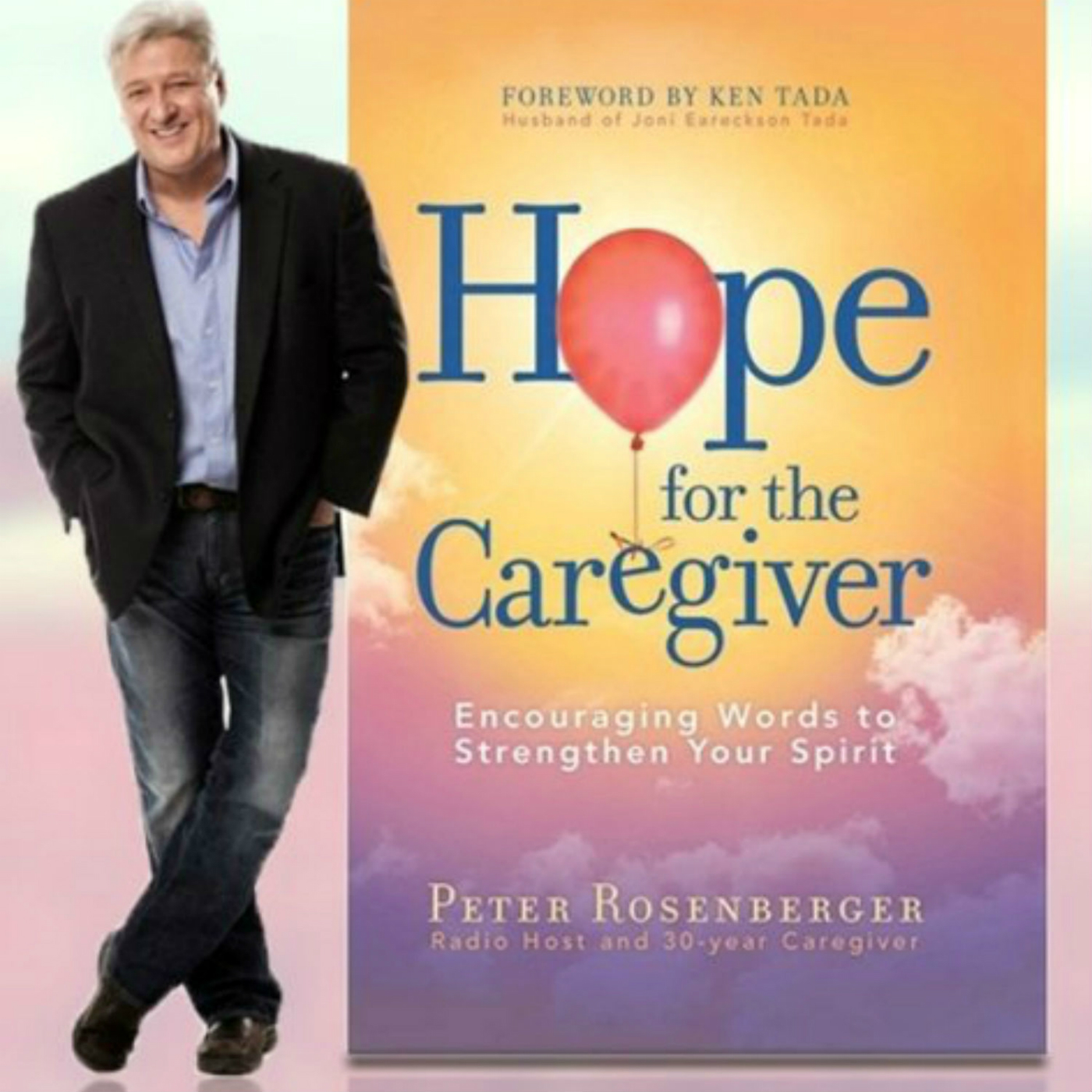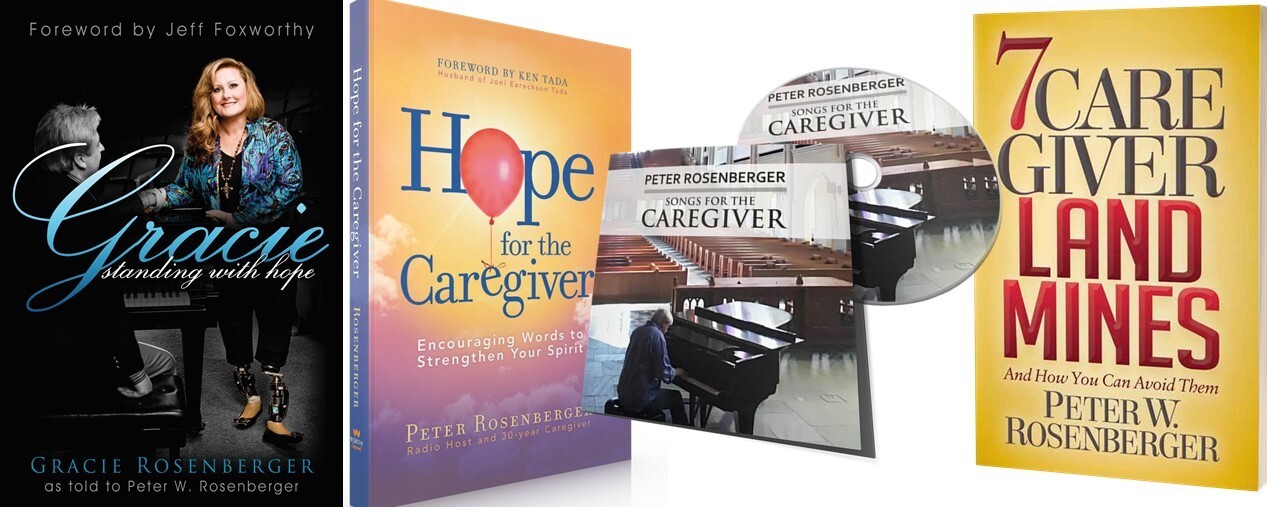Episodes
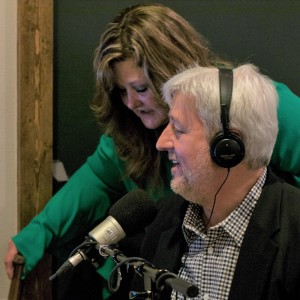
Tuesday Dec 10, 2019
Are you "sowing in tears?" This this episode is for you!
Tuesday Dec 10, 2019
Tuesday Dec 10, 2019
Those who sow in tears
shall reap with shouts of joy!
He who goes out weeping,
bearing the seed for sowing,
shall come home with shouts of joy,
bringing his sheaves with him. - Psalm 125:5-6
Are you sowing in tears? What does that even mean to us a caregivers. Take a listen to this episode as we unpack this Scripture and talk about it in the context of serving as a family caregiver.
Autism, Alzheimer's ...Addiction: There's always a caregiver.
Whenever you find someone with a chronic impairment, you always find a caregiver. That's why we do the show.
This episode is from our December 7 show and features, callers and a special song from Gracie. Her recently released CD is titled Resilient.
For a tax deductible contribution to Standing With Hope ( the presenting sponsor of this show) for any amount, we will send you Gracie's CD as our gift to you!.
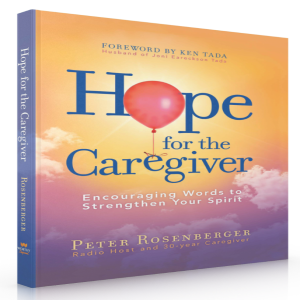
Saturday Nov 09, 2019
Friendly Fire and the Family Caregiver
Saturday Nov 09, 2019
Saturday Nov 09, 2019
During one of our many visits to Walter Reed Army Medical Center to meet with wounded warriors, we met a bitter young soldier struggling with wounds he received from friendly fire. In a terrible mistake, he suffered injuries from his own country’s military.
As my wife, Gracie, walked over to greet him, he rudely snapped at her. Lying on his back while working out on a physical therapy table, he could only see Gracie from the waist up. This young man had no idea of her seventy plus operations, or the loss of both of her own legs. The physical therapist working with him looked embarrassed, and quickly tried to cover for Gracie by telling the young man that she was welcome there–and had a lot of practical advice worth hearing.
Disbelieving the therapist, he snarled back hatefully. Momentarily stunned, she regained her composure, and, while holding on to a railing, propped her right prosthetic leg near where his head rested on the low workout table.
He not only noticed her state-of-the-art metal leg beside him (encased in a beautiful shoe, I might add), but his eyes turned to watch her balancing on her other artificial leg, as well.
“You’re not the only amputee in here, big guy.” Gracie said, while looking him squarely in the eye.
The soldier in him quietly nodded at her, and he didn’t say anything else.
Ten feet away, I listened to a man who, although he lost both legs, cracked jokes with a contagious sense of humor. His face clouded over, however, when I pointedly asked him how things were back home.
Looking down at his new prosthetic legs, he whispered out, “My marriage is on the rocks, and it doesn’t look good.”
The loss of his legs didn’t keep him from joking, but the wounds of his heart silenced the laughter.
Friendly fire.
I asked another mother in the PT room if her son’s father had been up to the hospital. Looking over at her son’s newly amputated left leg, as well as the halo device holding the pins piercing his right leg, her jaw tightened as she flatly said, “He left years ago, and good riddance.”
Friendly fire.
How many of us deal with deep wounds caused by those closest to us? How many of us have caused damage to the ones we love and swore to protect? Sometimes “friendly fire” wounds are compounded with the shame of the wound itself—we feel our wounds come with dishonor, and our fists clench with a rage that wants to choke the one(s) who hurt us. Other times, we realize with horror how poorly we treated those counting on us, and the guilt and shame fill us with despair.
It’s easy to recall those things that cause hot tears to pour out of our eyes—the things driving us to lash out at the ones who hit us with “friendly fire.” In our pain, we might even strike at people who are simply trying to encourage us.
Gracie propped an artificial limb on a physical therapy table to help a hurting young man gain perspective and, hopefully, see that he can move past this horrific life-altering injury.
Christ is the wounded warrior who presents His own wounds, not only to communicate perspective, but also demonstrate His love for each of us. He didn’t just prop a metal leg on the table; He laid down His life and was Himself wounded—for our sins. His wounds made it possible for ours to be healed. He never clenched His fists, but rather stretched out his hands and received the nails.
When we look at our wounds, even those inflicted by our loved ones …or even self-inflicted, it’s all too easy to despair. But when we lift our eyes to look at HIS wounds, we are strengthened to know that HE redeemed our souls—and is redeeming our wounds.
He heals the brokenhearted and binds up their wounds. Psalm 147:3
Sponsored by STANDING WITH HOPE

Monday Nov 04, 2019
"Don't Pass the Snowplow!"
Monday Nov 04, 2019
Monday Nov 04, 2019
Yes ...I know it feels like the snowplow driver is listening to Lawrence Welk while we listen to Led Zepplin, but in winter weather, the safest place is often the place where you feel it's going maddeningly slow.
That also applies to our journey as caregivers.
We find that we must move at a pace we can't control...and, just like trying to pass a snowplow, we run the risk of getting hurt if we try to circumvent.
A friend once told me, "Families move at the speed of their slowest members." When serving as a caregiver the "pace car" dictates how fast we're going to go. We're going to get there ...when we get there. Beating on our steering wheel, swearing, and/or spazzing out isn't going to make it better or faster, but it will cause unnecessary tension ...that robs us of living a calmer, healthier, and even safer life.
- Sometimes, the snowplow is a chronic illness that progresses.
- Sometimes, it's a special needs child that moves at his/her pace.
- Sometimes it's someone with a addiction that struggles in their recovery program.
- Sometimes it's grief that takes whatever time it needs to process it out.
In my 30+ years, I've discovered the pace set for me is simply living in the moment ...one day at a time.
Therefore do not worry about tomorrow, for tomorrow will worry about its own things. Sufficient for the day is its own trouble. Matthew 6:34
Listen to the callers share their stories, as well. Also, of course, joining the show is himself ...my sidekick, John Butler (The Count of Mighty Disco)
"Don't pass the snowplow is our "Caregiver Tip of the Day" for this show. Hope for the Caregiver is LIVE on Sirius XM's Family Talk Channel (131) at 6PM Eastern.
Brought to you by:
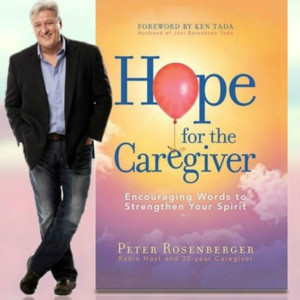
Friday Sep 06, 2019
Friday Sep 06, 2019
Marlene in Indiana struggles as a caregiver for her husband who has lung cancer. Although she cares for her husband, she also helps take care of other family members.
Marlene is living in the fear of tomorrow, next week, and next year.
We helped point her back to today and a path towards help for her.

Tuesday Aug 27, 2019
Ernie and his granddaughter.
Tuesday Aug 27, 2019
Tuesday Aug 27, 2019
Excerpt from HOPE FOR THE CAREGIVER on American Family Radio: 8/24/2019
It’s starting to dawn on a lot of us …some of who are newer to this, not so much, but a lot of us have that realization, “Man, this thing is not going to have the happy ending, it's not going to have the happy ending that we want, it's not going to get pretty. In fact, it's going to probably get worse.”
And what do you do with that information? What does hope look like in that?
And as I've struggled through these things and I've worked through these things myself, I determined I was going to offer this to my fellow caregivers to ways that they can point them to safety, point him to high ground where they can just catch their breath. And I got people that call in to the show that want to kind of insert their story into it, you know, “I've been taking care of my children,” but they're not special needs children, they're just children, I've got children.
But this is not “Hope for the Parent;” this is not “Hope for the Homeschooling Parent,” …this is Hope For The Caregiver.
This is not to teach you how to care-give, this is not to do any of those things, this is Hope For The Caregiver, who… that one person who is up night after night after night doing laundry.
Back and forth at doctors’ offices.
Looking at the bills mounting up.
Listening to somebody who…they are wiping their bottom… and getting cussed at by the same person.
Somebody whose father abused them as a child and now they're having to help him go to the bathroom.
This is who the show is for …to let you know that God has not forgotten you, He has not abandoned you. This is not some kind of curse from God, that's not what's going on here.
And this is your time.
As it was said in the scripture at the beginning of it, “Anxiety in a man's heart weighs him down, but a good word makes him glad; a good word makes him glad.”
How many of you right now are feeling so anxious, that are so weighed down? I can't take this burden off of you, you can't take mine off of me, but what we can do is help each other adjust this pack a little bit easier, and what we can do is we can build each other up and equip each other to be stronger as we carry it. What's happening is we're trying to muscle our way, white-knuckle our way through this and we're getting weaker by the day. I get that.
And so, what I'm trying to do on this show, what American Family Radio is helping me do is to come along and strengthen you for this journey. That's what it means when we bear one another's burdens. We're equipping each other to do this. We're not going to let you just get crushed by this. We want to point safety and we want you to know that your peace is available, it's right now, that peace that you're craving is available right now!
You don't have to wait for the funeral to be over… to have peace in your heart, you don't have to wait for that magical surgery that's going to fix this or that, whatever that treatment is.
You don't have to wait for that you don't have to wait for your loved one to stop acting the way they're acting, to stop drinking …stop putting drugs into their body.
You don't have to wait for that to have peace, you can have that right now; no kidding, right now.
It's not going to come without tears and it's not going to come without reinforcement and work and somebody pointing you to that place.
And I floundered around for so many years where people came… when people came up to me and just offered me stuff that we just looked at them like, “What's the matter with you?”
But I was young …and I didn't know much, and I didn't know how to respond to that. I didn't know how to push back on that and say, “No, this is not wrong.”
And bad theology has caused more damage for people, and we've got a lot of bad theology going on out there. So, when we sit down here with this network we said:
“You know what? We're going to put good theology in a way that caregivers can really understand into their hearts. We want to make sure that you clearly understand what the gospel means in this situation, that even as you are doing the things that you're doing, changing a dressing or a colostomy bag or picking up your special needs child and getting them to the toilet, that even in those moments when your heart is breaking, that the peace of God which transcends all understanding can still flood your heart in those moments; that's what the show is about.”
888-589-8840, 888-589-8840.
Peter: Ernie in Alabama. Ernie, good morning, how are you feeling?
Ernie: Good morning at Mr. Rosenberger. I should call you brother Rosenberger. Thank you for taking my call.
Peter: Well, you can just… how about you just call me Peter? You can just call me Peter.
Ernie: Peter, well, thank you thank you, Peter, thank you for your program, it's amazing. It has to be providential, I was telling the lady when I call that we’re caregivers for our granddaughter along with her mother. She's a teacher and so we take care of her, and she's 5 and a half years old, she’ll be 6 in October, so she's almost 6, and he suffers from FOXG1 syndrome. And FOXG1 is a deletion of 1 little gene in the 14th chromosome, and the symptoms are that she cannot… she cannot fit by herself nor stand by herself, she can support weight, but you cannot walk, she cannot crawl, she cannot sit from lying… in lying position, she cannot talk. She loves music, she loves people, she's aware of her surroundings, she understands her name and she cannot sing or do her ABCs. We take her to school, they have a real nice class, the… that happened at conception when the deletion misconstruction of her genetic code. And also, her problem also is the communication between her little brain to the different autonomous system.
Peter: Ernie, let me… Ernie, let me stop you for a second. One of the things we caregivers are very good at doing is we can rattle off our loved one’s chart, we could get down to the chromosome and DNA level, we could tell everything about our loved one. Ernie, how are you feeling?
Ernie: Yes, and this is one of the reason that it's a miracle, providential I would say. I'm a Christian, I believe in the power of Jesus, I believe in…
Peter: Ernie, I got… Ernie, Ernie, I got all that. How do you feel right now?
Ernie: Oh, yes, it’s exactly like what you say. The theology when people approach you and for example, like they say, “You know, the reason that your granddaughter is the way she is is because God knew that you were going to be a good provider.”
Peter: But Ernie, Ernie, you're still… you’re still not answering my question. I want you to take 1 word and tell me how your heart feels right now.
Ernie: Oh, it's devastating, it is devastating to go through what we go through and…
Peter: Well, it is devastating, and if you could do something for me, can you hang on? Don't hang up because we got to take a quick break, but I want to talk about [feeling] devastated, okay? Can you hang on with me?
Ernie: Sure.
Peter: Just hang on, don't go anywhere, we're going to take a quick break and I want to talk about this a little bit more. This is Hope For The Caregiver, this is Peter Rosenberger and this is the show for you as a family caregiver. You voluntarily put yourself in a situation where you’ve got to help an impaired loved on, how are you feeling? How are you feeling? How is your heart doing? Ernie and I are going to talk about that when we get back. 888-589-8840, we'll be right back.
BREAK
Welcome back to the show for caregivers, this is the nation's number one show for the caregiver and you know what? Because of AFR, we're out in front of this with the gospel.
We're not giving you New Age, psychobabble, Hallmark cards …We're giving you the authority and the clarity of the gospel in your situation as a caregiver. 888-589-8840, 888-589-8840; let me go back to Ernie.
Ernie, you see what I'm talking about here when I ask you how you're feeling and it took you going through your granddaughter’s chart and talked about all the things … you used a lot of words, but when it comes down to really how you're feeling, it's devastating to watch this. And that's what I want to talk about with you, I want to see how are you doing because I want to be able to speak to that devastating place in your heart. It is a hard thing to watch your family member, somebody you love deeply to be this way …and to go with these things and wondering with it. So, talk a little bit more about how are you feeling in this, Ernie?
Ernie: The… Peter, the most devastating part of all is whenever you see her suffering in pain in anguish, whenever you see her going into seizures, the first thing that comes in is to… it tries your faith. And then you would say you will say things like, “God, we've been praying for 6 years and look,” and then you say, “Do you care? Are you listening?” But then as soon as you say it and then whenever the seizures subside and she's feeling better, then the guilt of knowing then I didn’t have enough faith, enough staying on his world to trust him through this awful time. And that’s one… that's the most devastating part is the fact that I know that he cares, I know that he listens, I know that his hand is long to reach and help, but we do not understand why, and it goes to the why. And then so that is… and then you go through the period devastation of our faith, the devastation and, you know, we just feel so low…
Peter: Well let me…
Ernie: .. the fact that we tapped out.
Peter: Let me… let me speak something very specific to you in that, Ernie. And thank you for that, Ernie, thank you for trusting me with your heart because that now we're having a real conversation, because you do, you question why God is doing something, after the seizure is done, you breathe a little easy and then you feel guilty for it.
And no, no, no, I want you to understand that it's not your faith, it's not how much faith you have, it's not the fact that you could squint your eyes real hard and pray, it's the fact that you are calling up to God in the first place. That is the indication of your faith. That you recognize that there is a God and that He is supreme over this.
You don't understand it and it hurts your heart …and it frustrates you to watch your granddaughter go into these seizures, I get that, but the fact that you are calling out to this God at all, Ernie, is an indication that your faith is. And I want you to… I want you… I'm going to give you something very specific today because everything we do here is specific and focused on a caregiver, but I want you to remember this Psalm: Psalm 13.
And I'm going to read it to you, but I want you to look it up, and every time you feel this way, every time you struggle with this, would you go back and look at this Psalm? Let's see what it says,
“How long, Lord, will you forget me forever?
How long will you hide your face from me?
How long must I wrestle with my thoughts and day after day have sorrow in my heart?
How long will my enemy triumph over me?
Look on me and answer, Lord my God, give light to my eyes or I will sleep in death and my enemies will say, ‘I've overcome him,’ and my foes will rejoice when I fall.”
And here you go, here you go, Ernie, this is for you, this is what David says,
“But I trust in your unfailing love. My heart rejoices in your salvation, I will sing the Lord's praise for he has been good to me.”
Do you see the train of thought that he did as he wrote this Psalm under the guidance of the Holy Spirit? Because he cried out, “How long, Lord?”
You've been praying for 6 years with this granddaughter, you've been watching this situation unfold, and those questions that come, “How long are you going to let me just basically go to bed with his tears pulling… flowing from my eyes?”
But as he as he works his way through this, he comes back he said, “But here's what I'm going to do.”
And this is where you are, Ernie, you're in that Psalm 13 place where it is very, very difficult, and there are so many tears that come and you're saying, “How long?” and yet, you are still recognizing that that you have a Savior, you have a God who is who is keenly aware of this and you're conflicted on any given day.
Every caregiver, every one of us understand that conflict that comes in our hearts. And I want you to know that I appreciate you very much taking the time to just call and share your heart. It takes a while to get down to it because we want to rattle off all the chart, but what we're interested on this show right now, Ernie, is your chart, the chart of your heart, of how you feel.
And does that Psalm 13, can you… would you hang on to that for me? When you get to those places, would you hang on to it and go back and just spend some time reading Psalm 13?
Ernie: I will and I will share it with my wife and my daughter. And I cannot thank you enough for your compassion, for great thing that you're doing. And just yesterday she had another episode, and I was in my way this morning to a Bible study we do on Saturday mornings, and not only that, but there are also people in my group that have Alzheimer's, loved ones with Alzheimer's and I'm going to share this morning as soon as…
Peter: This is the show for your group, this is the show…
HOPE FOR THE CAREGIVER is an outreach of Standing With Hope
Ernie: I will.
Peter: … for your group and your daughter. And would you… would you read…? Do me do me a favor, just I'm asking you to just kind of take a little bit of a leap of faith, not just share this with your wife, but would you and your wife and your daughter sit around the table and would you hold each of their hands and will you read Psalm 13 to them, read it very, very, very slowly.
Ernie: I can do it with them, that would be…
Peter: Now, there will be some… there'll be some tears, there'll be some tears there, Ernie. OK? I'm just giving you a heads up, all of your eyes will fill with tears. But if you will stand in that gap as “the Godly priest of your home manner” …and read these words to your family, I promise you…
Ernie: I’m sure that will be…
Peter: I promise you something, and I want you… actually, I want you to call us back and tell us what happens in that moment. It won't be easy, it'll be… it'll be difficult, there'll be tears, but I want you to have that…
.. Actually, you know what? You don't want you don't need to call us back and tell us because that's a private moment with you and your family and God, but I believe that you'll… you'll know that you are stepping into a different place with your family in your relationship with God. But physically touch your wife and your daughter, hold their hands and read the scripture out loud, and read it slowly, I mean slowly, because our hearts move a lot slower than our mouths and our heads. And thank you for…
Ernie: It’s the correct Psalm.
Peter: Pardon me?
Ernie: It’s the correct Psalm, Psalm 13, so I surely will do that. And thank you so, so much for that, and I know that we expect victory from this, just the fact that, like you said, that he's there and he's there for us and… but…
Peter: The victory is… the victory is already there, this journey is… is honing you down to be in that place with God that you would not be otherwise.
The victory was assured at the cross and we have to walk in that victory.
Now, sometimes we think victory is when they stop having seizures, there's victory when they're having seizures, there's victory when all of this stuff is happening. As my wife groans in pain at various times, there's victory while she's groaning in pain. Somehow we've equated victory with problem-solving, and victory is a whole lot different.
And we can have victory, we can have peace, we could have joy right in the midst of these things. Now, I'm not saying this like I own this I'm saying this like I believe this …and I need to hear it over and over …and over again myself. You tracking with me?
Ernie: Yes.
Peter: So, the next time… next time your granddaughter has a seizure, I want you to understand that you have victory even in the midst of that seizure. The victory has not been stripped from you because it was not your victory, it was God's victory through what he did at the cross, that's our victory. And you hang on to that, hang on to that and help your wife and your daughter hang on to that.
Ernie: I sure will.
Peter: And that's how we're going to do it together. And, Ernie, I want you to know how much I appreciate you calling and sharing your family's journey. And you're important to us, we're part of the body of Christ, you're my family and we're going to we're going to we're going to strengthen each other together.
Ernie: Thank you.
Peter: And you've helped… you've helped strengthen me this morning, Ernie, so thank you.
Ernie: Well, thank you, thank you for your program and may God bless you.
Peter: Well he does and he has, and you go to your Bible study right now and share this with the Bible study there and then I'd like to hear from you in the future about just how you doing, okay?
Ernie: I will, thank you.
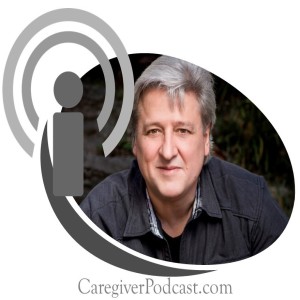
Friday Jul 26, 2019
Friday Jul 26, 2019
"I'm going to swerve into something today that I've been stewing on for a while ..."
That's how we started the July 20, 2019 show, and we tackled families struggling with addiction (alcoholism).
I said to a young man recently, "Honour thy father and thy mother.." (Exodus 12:20) DOES NOT MEAN YOU HAVE TO HONOR THE IMPAIRMENT!
When dealing with an addiction issue, family members all too often (and sadly) place themselves in bondage trying to enable.
The disease of addiction is a family disease, and will take everyone with it ...if allowed. Alzheimer's has no mercy ...and will crush everyone around an impaired loved one ...if allowed. Caregivers will sadly take so much abuse into their heart as they listen to a disease speak with the voice of a someone they love.
But it's the disease, not your mother, father, spouse, etc.!
Yet, so many struggle, often painfully, with tremendous sense of guilt while mistakenly honoring a disease or impairment instead of the parent or loved one.
We spend a good bit of time on this issue in today's show. Share this show with someone you know who is struggling with this.
if you're in a relationship with someone struggling with addiction/alcoholism, here is a helpful resource.
Hope for the Caregiver is the family caregiver outreach of Standing With Hope. If this show is helpful to you, we invite you to help sponsor this through a tax-deductible gift. www.standingwithhope.com/giving

Monday May 13, 2019
"How am I going to get my son with autism to adulthood?"
Monday May 13, 2019
Monday May 13, 2019
David from Ohio called the show with deep emotion as he struggled caring for his son who is on the autism spectrum. At thirteen, David's son is a handful ...and David broke down trying to wrap his mind around getting his son through to adulthood.
We discussed this and took the conversation into a path he didn't expect: the relationship between David and his wife ...as well as an important self-defense lesson I learned from my martial arts instructor.
As caregivers, we often live in the wreckage of our future ...and fear the worst. Yet, we're not there in the future, so we don't have to be held hostage by something that hasn't happened. in our conversation, David discovered the opportunities available to him in the "here and now" that will greatly assist him in caring for his son through difficult times that lie ahead.

